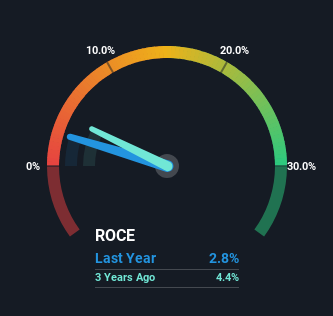Stock Analysis
- United Arab Emirates
- /
- Hospitality
- /
- ADX:NCTH
National Corporation for Tourism and Hotels' (ADX:NCTH) Returns On Capital Not Reflecting Well On The Business

There are a few key trends to look for if we want to identify the next multi-bagger. In a perfect world, we'd like to see a company investing more capital into its business and ideally the returns earned from that capital are also increasing. Put simply, these types of businesses are compounding machines, meaning they are continually reinvesting their earnings at ever-higher rates of return. Having said that, from a first glance at National Corporation for Tourism and Hotels (ADX:NCTH) we aren't jumping out of our chairs at how returns are trending, but let's have a deeper look.
Understanding Return On Capital Employed (ROCE)
For those who don't know, ROCE is a measure of a company's yearly pre-tax profit (its return), relative to the capital employed in the business. The formula for this calculation on National Corporation for Tourism and Hotels is:
Return on Capital Employed = Earnings Before Interest and Tax (EBIT) ÷ (Total Assets - Current Liabilities)
0.028 = د.إ72m ÷ (د.إ2.8b - د.إ226m) (Based on the trailing twelve months to September 2023).
So, National Corporation for Tourism and Hotels has an ROCE of 2.8%. Ultimately, that's a low return and it under-performs the Hospitality industry average of 7.0%.
See our latest analysis for National Corporation for Tourism and Hotels

While the past is not representative of the future, it can be helpful to know how a company has performed historically, which is why we have this chart above. If you're interested in investigating National Corporation for Tourism and Hotels' past further, check out this free graph of past earnings, revenue and cash flow.
So How Is National Corporation for Tourism and Hotels' ROCE Trending?
On the surface, the trend of ROCE at National Corporation for Tourism and Hotels doesn't inspire confidence. Around five years ago the returns on capital were 4.4%, but since then they've fallen to 2.8%. And considering revenue has dropped while employing more capital, we'd be cautious. If this were to continue, you might be looking at a company that is trying to reinvest for growth but is actually losing market share since sales haven't increased.
In Conclusion...
In summary, we're somewhat concerned by National Corporation for Tourism and Hotels' diminishing returns on increasing amounts of capital. Yet despite these poor fundamentals, the stock has gained a huge 141% over the last five years, so investors appear very optimistic. In any case, the current underlying trends don't bode well for long term performance so unless they reverse, we'd start looking elsewhere.
One more thing to note, we've identified 2 warning signs with National Corporation for Tourism and Hotels and understanding these should be part of your investment process.
While National Corporation for Tourism and Hotels isn't earning the highest return, check out this free list of companies that are earning high returns on equity with solid balance sheets.
Valuation is complex, but we're helping make it simple.
Find out whether National Corporation for Tourism and Hotels is potentially over or undervalued by checking out our comprehensive analysis, which includes fair value estimates, risks and warnings, dividends, insider transactions and financial health.
View the Free AnalysisHave feedback on this article? Concerned about the content? Get in touch with us directly. Alternatively, email editorial-team (at) simplywallst.com.
This article by Simply Wall St is general in nature. We provide commentary based on historical data and analyst forecasts only using an unbiased methodology and our articles are not intended to be financial advice. It does not constitute a recommendation to buy or sell any stock, and does not take account of your objectives, or your financial situation. We aim to bring you long-term focused analysis driven by fundamental data. Note that our analysis may not factor in the latest price-sensitive company announcements or qualitative material. Simply Wall St has no position in any stocks mentioned.
About ADX:NCTH
National Corporation for Tourism and Hotels
National Corporation for Tourism and Hotels invests in, owns, and manages hotels and leisure complexes in the United Arab Emirates.
Adequate balance sheet with acceptable track record.

